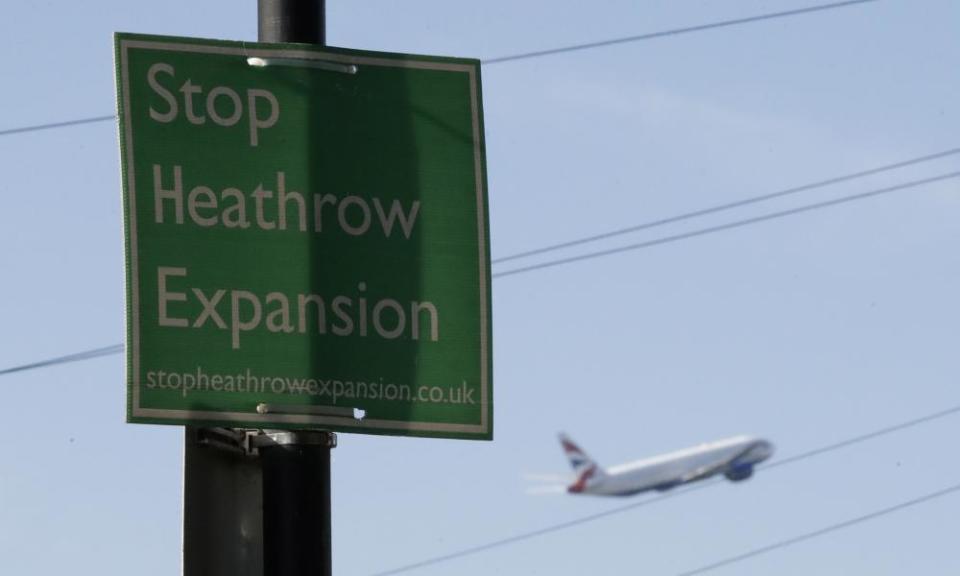Heathrow runway ruling puts planet over needs of UK plc

The legal case against Heathrow airport expansion pitted the need to tackle the climate crisis against economic arguments on behalf of UK plc, and for the first time in any major infrastructure project, the planet won.
John Holland-Kaye, chief executive of the airport, made a last-minute PR push on Radio 4’s Today programme on the eve of the appeal court decision, claiming expansion was the “key to delivering the prime minister’s vision of a global Britain” after Brexit.
But it was the impact on the climate of increased aviation emissions from the 260,000 extra flights a year a third runway would bring, which held sway in the appeal court.
The environmental groups Friends of the Earth and Plan B argued the expansion would jeopardise the UK’s ability to make the very deep reductions in greenhouse gas emissions that are necessary to stop global warming from causing catastrophic and irreversible impacts.
What just happened?
For the first time judges have said that plans for a major infrastructure project are illegal because they breach the UK's commitments to reduce greenhouse gas emissions to tackle the climate crisis. This is a groundbreaking legal decision that could effect future infrastructure developments and puts the UK’s commitment to cut emission to net zero by 2050 at the forefront of future policymaking.
What will happen next?
The government has been told by the court of appeal to declare its decision to allow Heathrow airport expansion - contained in its airline national policy statement - illegal. Ministers have two choices now. They can withdraw the whole policy statement or try to amend it to make it compatible with the UK’s commitments to reduce greenhouse gas emissions to net zero by 2050.
Will the runway be built?
If the government can prove that expanding Heathrow is compatible with its commitments under the Paris agreement to very radically reduce greenhouse gas emissions, the runway may go ahead. But the prime minister has always been against the third runway, and the government has told the court it will not be appealing against its decision on Thursday.
There now hangs a very big question mark over whether the bulldozers will ever start work on the runway.
The then transport secretary, Chris Grayling, they argued, acted unlawfully when he agreed to the expansion of Heathrow in the government’s airports national policy statement – he had failed to take into account the UK’s international obligations under the Paris agreement, and its own domestic law.
The judges’ ruling in favour of the two campaign groups puts the need for the UK to make significant reductions in greenhouse gas emissions and the requirements of the Paris agreement at the front and centre of policymaking. It is a judgment that could have lasting implications for infrastructure projects in the years ahead.
The ruling strikes a warning note that the climate crisis means it can no longer be business as usual. In future, economic and business decisions must take into account the impact on global heating to have both legal standing and political credibility.
And this ruling comes in the year the UK’s trustworthiness on these issues comes under the global spotlight, as the government hosts the key UN international climate talks, Cop 26, in Glasgow in November.
In the long history of Heathrow’s planned expansion, during which both Labour and Conservative governments have backed a third runway, those protesting that its environmental impact is just too great have seemed to be the underdogs.
Arguments about increased air pollution and noise pollution, and the severe negative consequences of effectively tacking a new airport with the capacity of Gatwick on to Heathrow, have been met by politicians and business leaders contending that expansion is vital to the economic prosperity of the UK.
Nothing, Grayling said last year, must stop this “massive economic boost”.
Now it seems the impact of human activity on the planet has outweighed the economic holy grail of Heathrow expansion.
But campaigners – some of whom have been fighting for decades to stop the runway – will hold in the back of their minds the words of another Conservative prime minister, David Cameron, even as they celebrate the appeal court ruling.
Cameron promised them in 2010: “No ifs, no buts, no new runway,” only to commission a report which paved the way for the runway to be approved.
This latest legal challenge – at at time of acute and growing public concern about climate change – might just prove decisive for Heathrow Airport Ltd, and political supporters of its project. The make-up of parliament has also changed considerably since the Commons voted in favour of the third runway in 2018.
What the judges did not do on Thursday was cancel the expansion. But they have thrown a big, perhaps insurmountable, obstacle in its path – and given Boris Johnson, who as a backbench MP threatened to lie down in front of the bulldozers to stop a third runway, a compelling reason to scrap it.

 Yahoo News
Yahoo News 